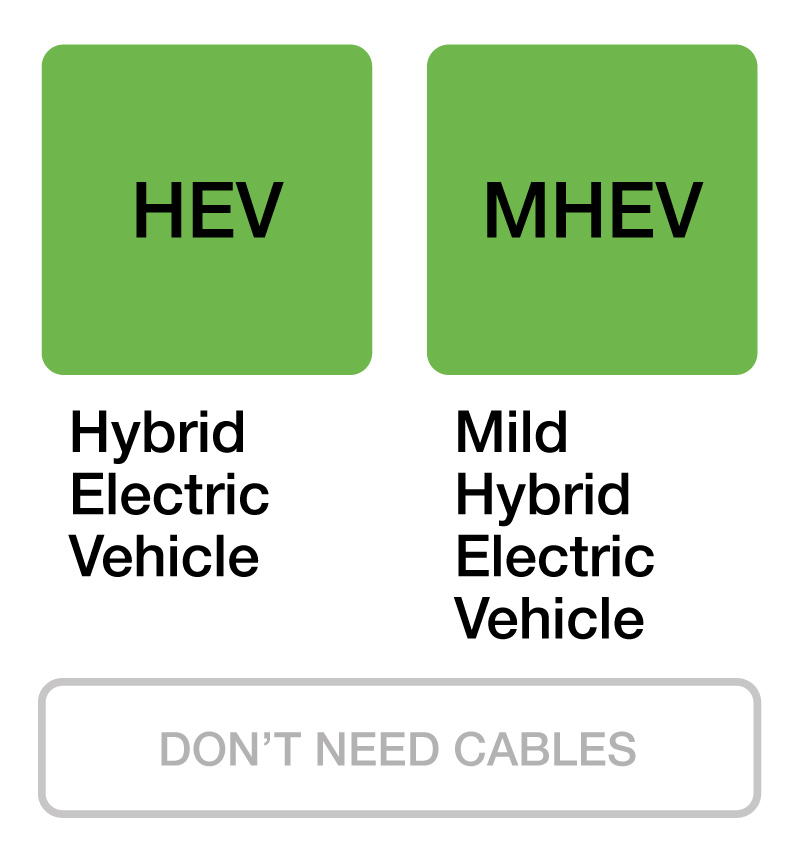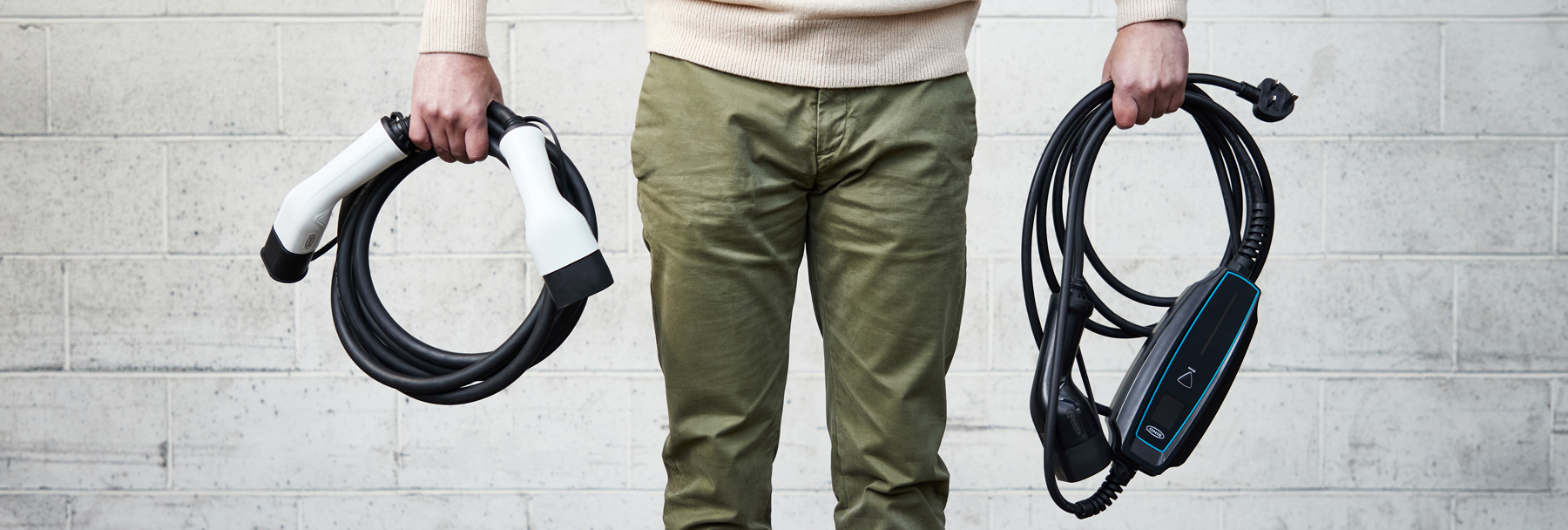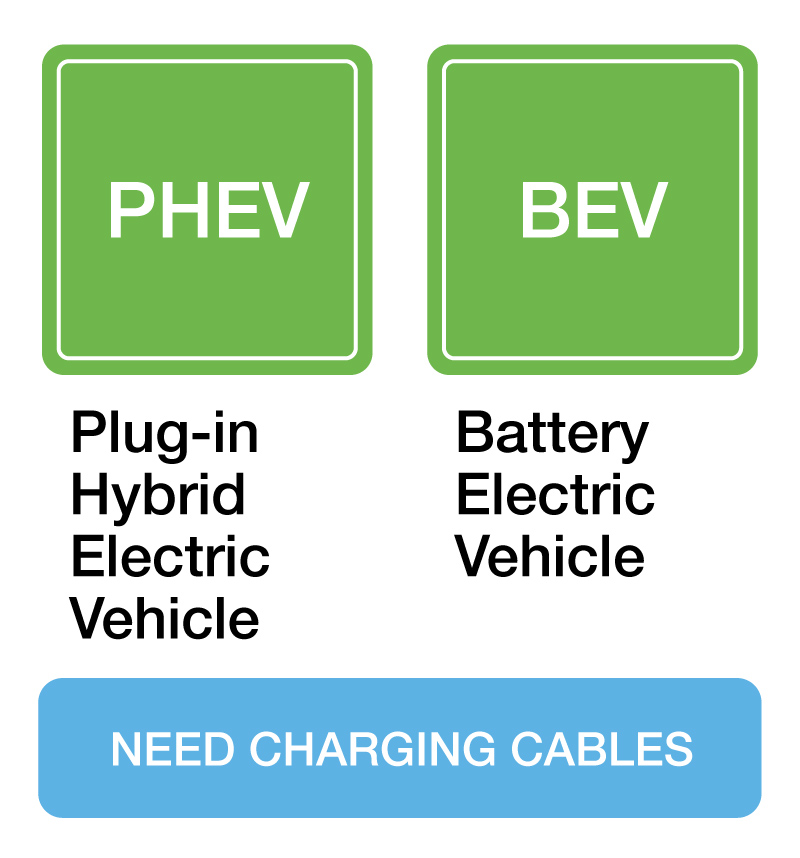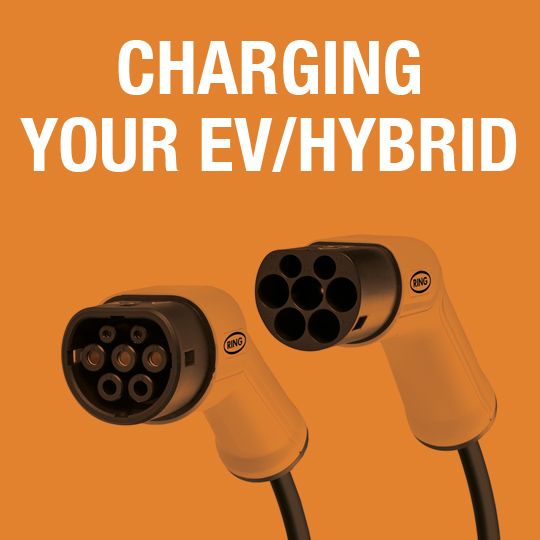Types of EV
Different electric vehicles
There are four main types of electric cars – each uses electricity for power in some way.
Hybrids and Mild Hybrids:
Hybrids and Mild Hybrids both have batteries alongside a conventional fuel engine. Neither of these need to be plugged in to charge, but do use less petrol – a full Hybrid uses around 30% less fuel than conventional fuel-powered vehicles.
Hybrids run mainly on conventional fuel, but use electricity when stopped or driving slowly. A full hybrid has a larger battery, and can run on electricity alone for short distances.
Mild Hybrids have a smaller battery than a Hybrid, which helps the petrol or diesel engine perform more economically. The car cannot run on electricity alone, not even when stationary.

Plug-in Hybrids and Battery Electric Vehicles
There are two types of EVs that need to be plugged in to charge: Plug-In Hybrid Electric Vehicles (PHEVs) and Battery Electric Vehicles (BEVs).
Like a full Hybrid, PHEVs have a conventional motor and an electric battery. But they have larger batteries, which can power the car for longer distances without needing diesel or petrol – up to around 30 miles. The larger battery means that they need to be plugged in to recharge.
A BEV runs entirely on electricity. This makes its emissions far lower than a conventional or even a Hybrid or PHEV. Nearly all recently made electric cars can go 130 miles on a full charge. Many having a range of over 200 miles, and some can go over 300 miles before needing a charge.
Plug-in Hybrid Electric Vehicles (PHEV) and Battery Electric Vehicles (BEV) will need a charging cable. The type of cable will depend on where you expect to be charging.


Charging Hybrid or Battery Electric Vehicles at home
When you’re charging at home, you can use a standard 3-pin plug as your power supply. However, this takes a long time due to the amount of power the battery requires – as long as 36 hours for a larger vehicle. This may be the only solution should you need to charge at a different home location – for example, when visiting family or friends.

Click here to see the Ring range of Portable Charging solutions should you need to use a 3-pin plug based power supply.
Dedicated home EV wall charging solutions are available to offer faster charging speeds. Selecting the right cable for an EV wallbox socket is essential, so that you can make the most of the charging speed available. To be able to use the faster 7.2kW at-home charging, you’ll need a 32A cable.
| Example charging times for single phase AC power supplies | ||
|---|---|---|
| Battery Size | 16A Cable Max Output 3.6kWh | 32A Cable Max Output 7.2kWh |
| 30kWh | 8 hrs | 4 hrs |
| 60kWh | 16 hrs | 8 hrs |
| 90kWh | 24 hrs | 12 hrs |
Click here to see the guide to for selecting the right Ring EV cable
Click here for the range of Ring EV charging cables
Charging when you’re out and about
There are now over 18,000 electric car charging points across the UK, you’ve no doubt seen them in car parks near you. Many of these offer rapid charging using three phase electricity supply. Typically any charge point above 22kW will be direct power (DC) which will have an additional 2 pin connecter that works with your car connector. Most DC charge points will have tethered cables. Your cars battery management system (BMS) will determine if your car can take advantage the different rapid charge options. Ring's range of EV cables cover all electric/hybrid vehicles and are durable and waterproof to deal with all types of weather and road conditions. They are designed for AC charging up to 22kW. It is important to select the right cable to take advantage of faster charging speeds depending on where you expect to be charging your vehicle.
| Example charging times for Single Phase and Three Phase AC power supplies | |||
|---|---|---|---|
| Battery Size | 16A Cable Single Phase Max Output 3.6kWh | 32A Cable Single Phase Max Output 7.2kWh | 32A Cable Three Phase Max Output 22kWh |
| 30kWh | 8 hrs | 4 hrs | 1.5 hrs |
| 60kWh | 16 hrs | 8 hrs | 3 hrs |
| 90kWh | 24 hrs | 12 hrs | 4.5 hrs |
If you need more information on EV/Hybrid charging please see our help guide
Click here to see the guide to for selecting the right Ring EV cable
Click here for the range of Ring EV charging cables

 Free Delivery On Orders Over £25*
Free Delivery On Orders Over £25* Pay In Three Available Over £30
Pay In Three Available Over £30 Two Year Guarantee Included*
Two Year Guarantee Included*


